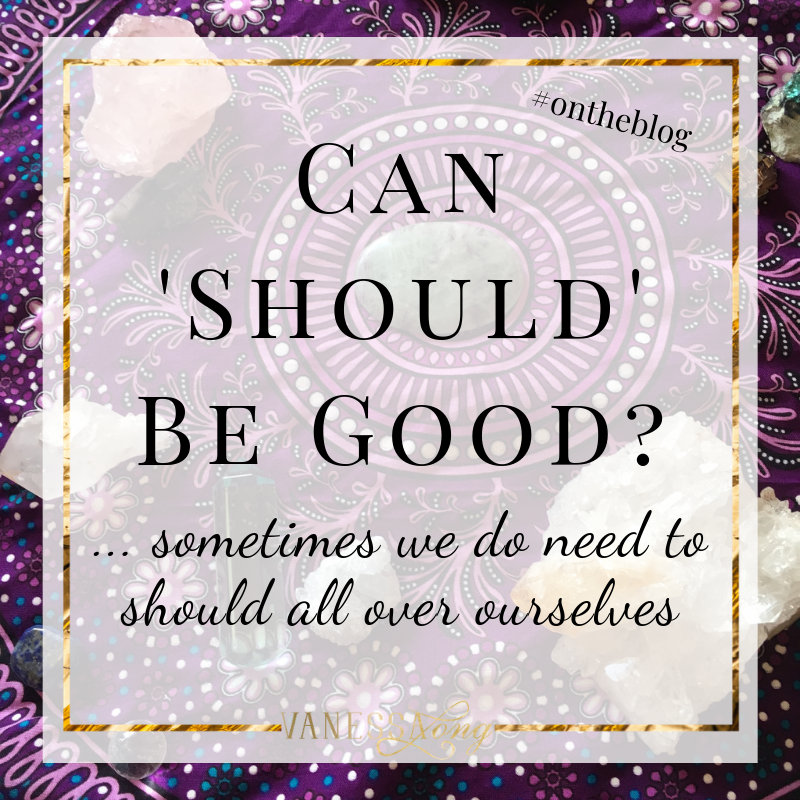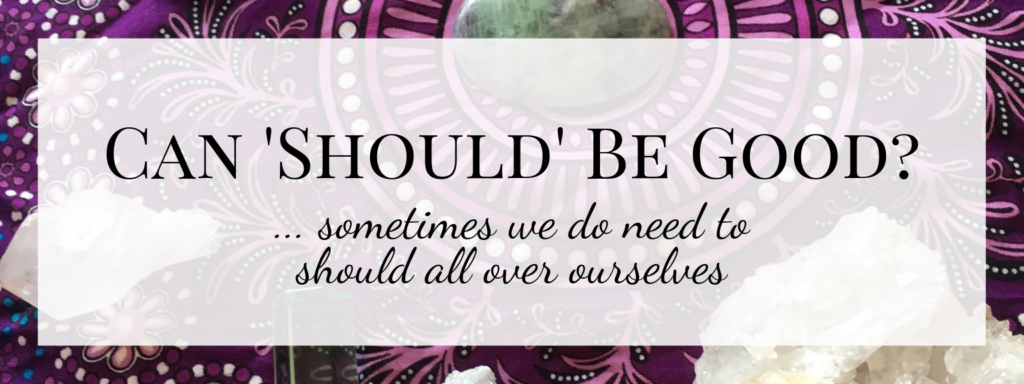Can Should’s Be Good
Sometimes we do need to should all over ourself…
(Part 1/3)
Ever since I became a Coach I’ve had a few rules – standards, expectations, boundaries – that I’ve followed very closely. They’ve helped me to be a PowerHouse Coach who gets great results in her own life and with her clients.
(seriously, my clients are up to great things… it’s such a privilege to work with them)
One of those rules is this: Don’t should all over yourself.
Y’see, should is a problematic word for me. When we say should, what we’re really saying is, “This is something that someone somewhere along the way has told me to do that I don’t really want to do”.
We All Have Our ‘Should’ List
I should…
… do yoga / meditate / wash my car every week / eat salad every day / work out 5x/week for at least 30 minutes each time … and on and on and on.
I should…
… be happy / thin / prettier / bustier / slim / stronger / taller / shorter / blonder / less blond / sexier / more powerful / louder / quieter / funnier / more extroverted / more introverted … and on and on and on.
I should…
… have a better social media feed / better car / more money / less money / more social media posts / prettier things / a cleaner house / more clients / higher fees / more group programs / all organic whatever whatever … and on and on and on.
Ultimately, should’s are the judgements we level on ourselves and others that tell us we are wrong. That we are doing something wrong, being something wrong, or having something wrong.
And we all have lists of should’s. Lots and lots of them. Much of the work that I do with my clients is unravelling their unconscious should list to create space for them to discover what they actually want to do, be, and have.

We Have to Unravel Our Should’s
It’s only when we discover and unravel our should’s – who everyone else told us to be – that we are free to be who we are truly meant to be.
And that has worked really well for me and for the people I work with.
But…
But, I had a conversation with our youngest a few months ago that shed some very illuminating light on should’s and put them in a whole next context for me. It’s taken me this long to figure out what it all actually means and why it’s so important.
And, unsurprisingly, it connects to shame. Remember the 3-part series I did on shame last month? (you can see it here…)
Well, in that series, I talked about how shame was actually our locus of conformity. Shame tells us when we’re getting out of alignment with the norms and expectations of our ‘tribe’. It not-so-gently encourages us to get back in line.
I dropped the bomb that shame can be used for good or for ill.
It can propel us forward toward our dreams or it can drag us back onto the line of fate where we stay locked up tightly in generational chains.
The key is to be conscious of our shame and know exactly where it’s coming from. Then we can use it to get where we want to go.
Sometimes, Shame is Exactly Appropriate
If we’re being less than who we are meant to be, we’re going to feel twinges of shame. If we know that we’re out of integrity or trying to ‘get away with something’, we’re going to have shame about it.
And that’s not necessarily a bad thing.
Shame is only bad when it becomes our dominant emotion. When we have a generalized feeling that we are worthless and wrong and broken and bad. When shame becomes toxic, it is the strongest poison we have.
(and, by the way, that’s the vast majority of people the vast majority of the time. our culture doesn’t teach us to work with shame, only to repress it… we live and breathe shame every day in a thousand different ways)
So, I’m going to unpack how my son helped me to see that sometimes, our should’s are really useful and important and, just like the ‘negative emotions’ that culture tells us are bad and to avoid, how we can use them to get to our dreams and create powerful Pivot Points in our world…
… stay tuned for Part 2.
You’re here to change the world and we’re here to help.
You’ve got this.

Love what you’re reading? Pin it!
It makes life so much easier. 😍

1Replies to Can Should’s Be Good
-
Pingback: Can 'Should' Be Good | Powerhouse Coach Training
Comments are closed.
Read Similar Articles
Posted in: Emotional ManagementTagged as: Locus of Conformity, Negative Emotions, shame, Why is should bad
